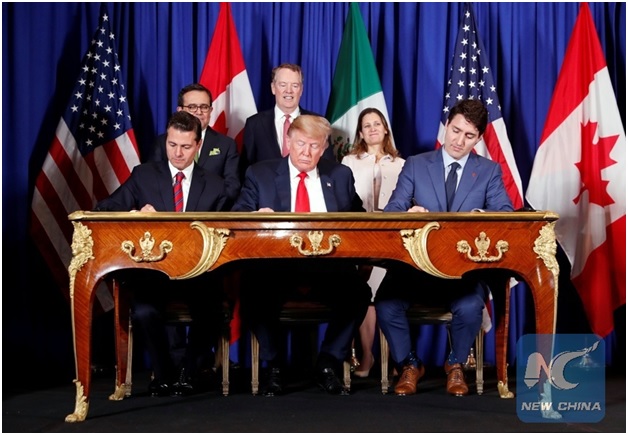Investors trying to stay focused on significant economic and financial news have been especially challenged in recent weeks, with high political drama unfolding in Washington and seemingly monopolizing journalists’ attention.
One of the longstanding legislative items that could be significant for markets and the U.S. economy is the fate of the stalled USMCA (the “U.S./Mexico/Canada Agreement”) — the trade pact negotiated to succeed NAFTA. It has already been approved by Mexico. Canada has indicated that it will follow the lead of the U.S. in ratifying it. But Tuesday marked a year that the treaty has been stuck in the U.S. Congress without a resolution.
Leaders of Mexico, the U.S., and Canada Approve the USMCA Text in November, 2018

Source: Xinhua
Republicans largely support it; Democratic opposition has been focused on a few specific issues, rather than a typically partisan “full court press” that it’s fundamentally flawed and needs to be scrapped. Democratic lawmakers have cited concerns about enforcement, labor and environmental standards, and provisions related to drug pricing. (Notably, some of the issues are more related to the reliability of separate reform packages passed in Mexico than they are to the text of the deal itself.)
Last week, Richard Neal (D–MA), the Chair of the House Ways and Means Committee, reported that negotiations with the U.S. Trade Representative (USTR) Robert Lighthizer and his team, underway since June, were going well — and that approval of the deal was “in the sixth inning.” That’s somewhat disappointing, because Canadian elections could create further hiccups. But still, progress does indeed seem to be occurring, even though an observer could be forgiven for thinking that the U.S. government is nothing but a wasteland of partisan gridlock.
The deal is basically a good one, and is an improvement on NAFTA, as most observers agree. It will be good for the U.S., strengthening the U.S. trading position with two neighbors who account, for example, for 30% of U.S. agricultural exports. The International Trade Commission sees the deal creating $68 billion in wealth and 176,000 new American jobs.
Investment implications: As the drumbeat of negative economic news continues, it’s important to pay attention not just to what can go wrong, but to what can go right. A successful ratification of USMCA will help markets see through the current economic slowdown, which we believe is a slowdown within the current cycle (similar to those of 2012 and 2015–2016) rather than a sign of the cycle’s imminent demise. It could be one incremental piece of news to get markets’ attention back on the economics and away from the politics.

